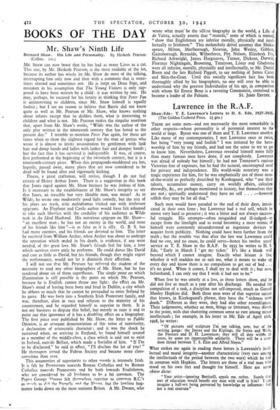BOOKS OF THE DAY
Mr. Shaw's Ninth Life
MR. SHew can now boast that he has had as many Lives as a cat. This one, by Mr. Hesketh Pearson, is the most readable of the lot, because its author has wisely let Mr. Shaw do most of the talking, interrupting him only now and then with a comment that is some- times shrewd and sometimes not. He is inept on Dean Inge, and mistaken in his assumption that The Young Visiters is only sup- posed to have been written by a child: it was written by one. He may, perhaps, be excused for his fatuity in thinking that Peter Pan is uninteresting to children, since Mr. Shaw himself is equally foolish ; but I see no reason to believe that Barrie did not know quite as well as Mr. Pearson or Mr. Shaw, who knows nothing about infants except that he dislikes them, what is interesting to children and what is not. Mr. Pearson makes the singular assertion that, apart from Mr. Shaw's works, "Wilde was the author of the only play written in the nineteenth century that has lasted to the present day." I tremble to-naention Peter Pan again, for these are times when to show the slightest regard for the man of genius who wrote it is almost to invite assassination by gentlemen with lank hair and damp hands and ladies witManker hair and damper hands ; but the fact that it has survived is indisputable. It was, of course, first performed at the beginning of the twentieth century, but it is a nineteenth-century piece. When this propaganda-maddened era has, happily, passed away, many plays that are now considered to be dead will be found alive and vigorously kicking.
Pinero, a great craftsman, will revive, though I do not feel certain of Henry Arthur Jones. There is a suggestion in this book that Jones raged against Mr. Shaw because he was jealous of him. Is it necessary to the establishment of Mr. Shaw's integrity to say that Jones, an irascible but very likeable man, was mean? As to Wilde, he wrote one moderately good light comedy, but the rest of his plays are trash, stale melodramas tricked out with irrelevant epigrams. An Elephant and Castle author would have felt ashamed to take such liberties with the credulity of his audience as Wilde took in An Ideal Husband. His notorious epigram on Mr. Shaw- " an excellent man ; he has not an enemy in the world, and none of his friends like him "—is as false as it is silly. G. B. S. has had many enemies, and his friends are devoted to him. The letter he received from William Archer, when Archer was about to undergo the operation which ended in his death, is evidence, if any were needed, of the great love Mr Shaw's friends feel for him, a love which survives every antic he performs. He could dance like David and care as little as David, but his friends, though they might regret the performance, would not let it diminish their affection.
I will not say that Mr. Pearson has relieved the student of the necessity to read any other biographers of Mr. Shaw, but he has rendered about six of them superfluous. The single point on which illumination is still possible is the point on which Mr. Pearson, because he is English, cannot throw any light: the effect on Mr. Shaw's mind of having been born and bred in Dublin, a city which he abhors so much that he cannot be persuaded to enter Ireland by its gates. He was born into a Southern Irish Protestant family, and was, therefore, alien in race and relieion to the majority of his countrymen, and he regarded himself as superior to them. It is
not my business to dispute this belief, but merely to state it and to point out that ignorance of it has a disabling effect on a biographer. The first piece ever published by Mr. Shaw, the letter to Public Opinion, is an arroeant demonstration of this sense of superiority,
a declaration of aristocratic character ; and it was the shock he
sustained when, on arriving in England, he found himself treated as a member of the middle-class' a class which is said not to exist
in Ireland, outs;cle Belfast, which made a Socialist of him. "If I'm to be disclassed," he said in effect, "I'll disclass the lot of you! " He thereupon joined the Fabian Society and became more class- conscious than ever.
This assumntion of superiority to other neonle is intensely Irish. It is felt by Protestants towards Roman Catholics and by Roman Catholics towards Protestants and by both towards Englishmen,
who are considered by all Irishmen to be a bit common. The Papist George k A °ores felt themselves superior to common R.C.'s
as rr-ich as


























 Previous page
Previous page